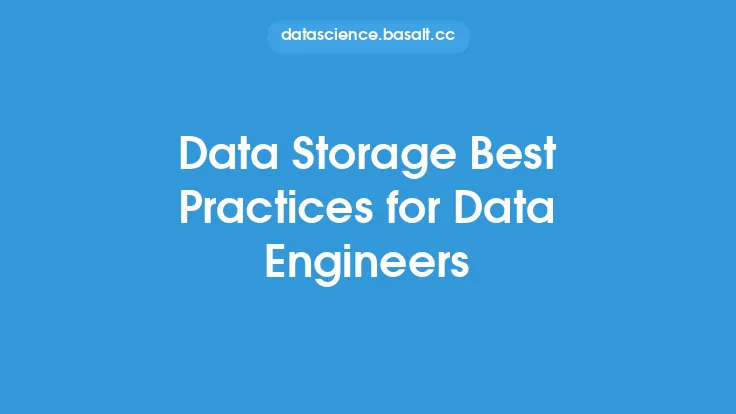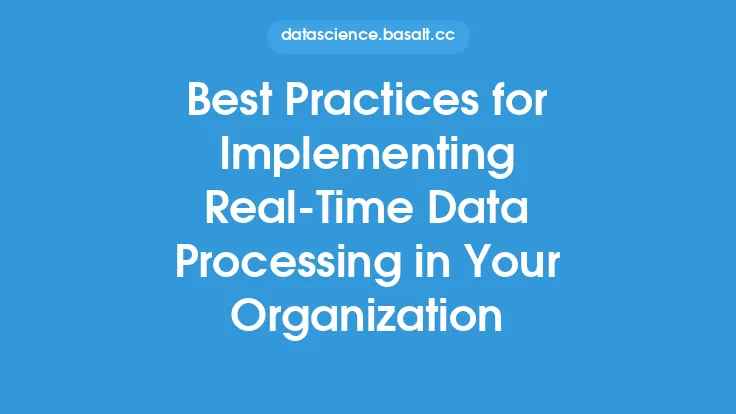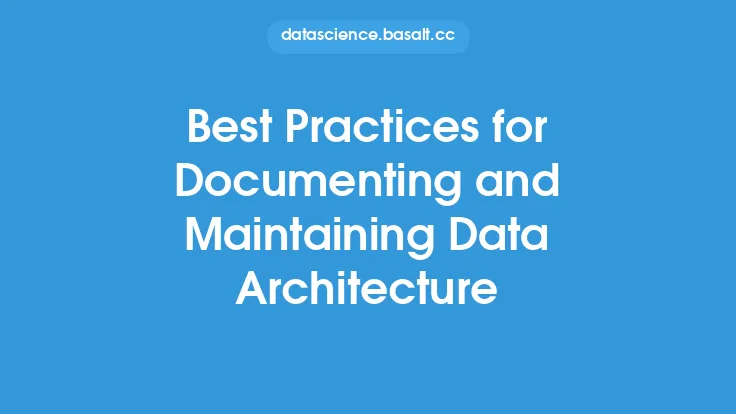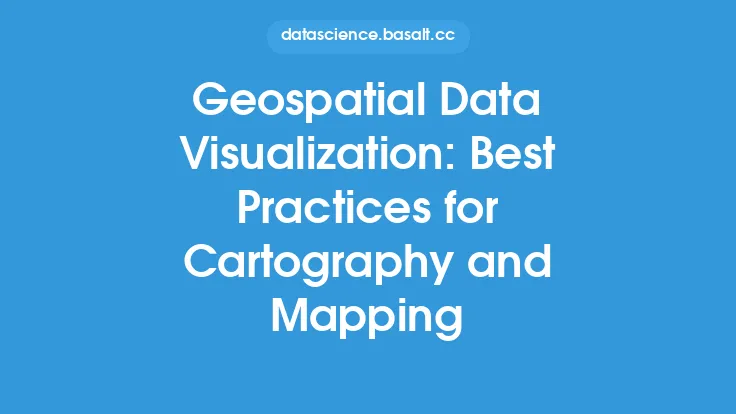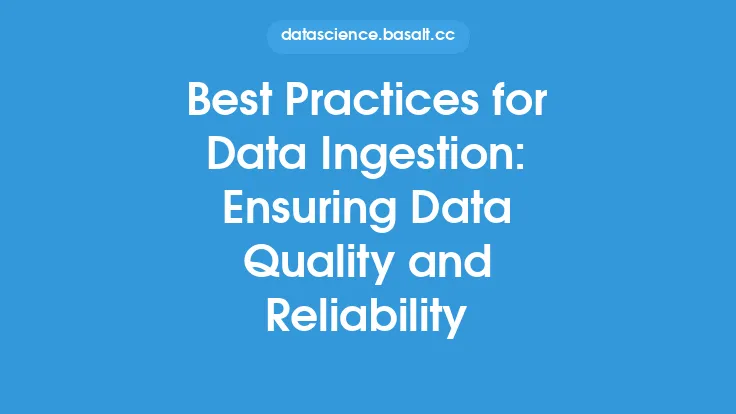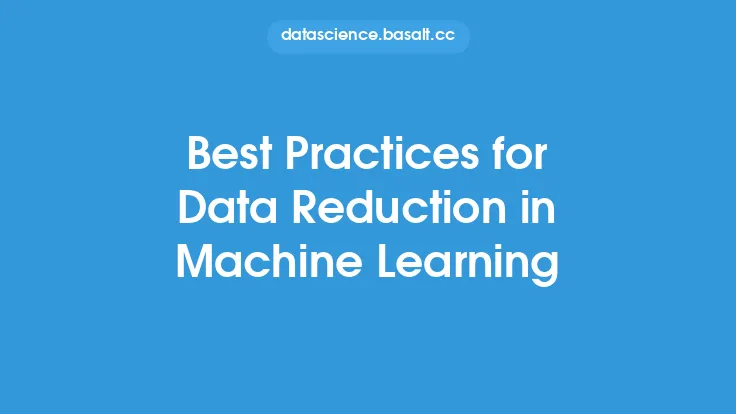Data processing is a critical component of data engineering, and as such, it's essential to follow best practices to ensure that data is handled efficiently, effectively, and securely. Data engineers play a vital role in designing, building, and maintaining large-scale data systems, and adhering to best practices is crucial to ensure the quality, reliability, and performance of these systems. In this article, we'll delve into the key best practices for data processing that data engineers should follow.
Introduction to Data Processing Best Practices
Data processing best practices are guidelines that ensure data is processed in a way that is consistent, reliable, and efficient. These practices cover various aspects of data processing, including data ingestion, data transformation, data storage, and data retrieval. By following these best practices, data engineers can ensure that their data systems are scalable, maintainable, and provide high-quality data to support business decision-making. Some of the key benefits of following data processing best practices include improved data quality, increased efficiency, and reduced costs.
Data Ingestion Best Practices
Data ingestion is the process of collecting and transporting data from various sources to a central location for processing. To ensure efficient data ingestion, data engineers should follow several best practices. First, they should use scalable and fault-tolerant data ingestion tools that can handle large volumes of data. Second, they should implement data validation and data cleansing techniques to ensure that the data is accurate and consistent. Third, they should use data ingestion frameworks that support multiple data sources and formats, such as Apache NiFi, Apache Kafka, or AWS Kinesis. Finally, they should monitor data ingestion pipelines to detect any issues or anomalies and take corrective action promptly.
Data Transformation Best Practices
Data transformation is the process of converting data from one format to another to make it suitable for analysis or processing. To ensure efficient data transformation, data engineers should follow several best practices. First, they should use scalable and efficient data transformation tools that can handle large volumes of data, such as Apache Spark, Apache Beam, or AWS Glue. Second, they should implement data transformation workflows that are modular, reusable, and easy to maintain. Third, they should use data transformation techniques that preserve data quality and integrity, such as data normalization, data aggregation, and data filtering. Finally, they should test and validate data transformation workflows to ensure that they produce accurate and consistent results.
Data Storage Best Practices
Data storage is the process of storing processed data in a scalable and efficient manner. To ensure efficient data storage, data engineers should follow several best practices. First, they should use scalable and distributed data storage systems that can handle large volumes of data, such as Apache Hadoop, Amazon S3, or Google Cloud Storage. Second, they should implement data storage architectures that are optimized for performance, such as data warehousing, data lakes, or NoSQL databases. Third, they should use data storage formats that are efficient and compact, such as Apache Parquet, Apache Avro, or JSON. Finally, they should implement data backup and recovery procedures to ensure that data is safe and can be recovered in case of failures or disasters.
Data Retrieval Best Practices
Data retrieval is the process of retrieving processed data for analysis or reporting. To ensure efficient data retrieval, data engineers should follow several best practices. First, they should use scalable and efficient data retrieval tools that can handle large volumes of data, such as Apache Hive, Apache Impala, or AWS Redshift. Second, they should implement data retrieval workflows that are optimized for performance, such as using indexes, caching, or query optimization techniques. Third, they should use data retrieval techniques that preserve data quality and integrity, such as data filtering, data aggregation, and data sorting. Finally, they should monitor data retrieval pipelines to detect any issues or anomalies and take corrective action promptly.
Security and Governance Best Practices
Security and governance are critical aspects of data processing that ensure data is handled in a secure and compliant manner. To ensure secure and governed data processing, data engineers should follow several best practices. First, they should implement data encryption and access control mechanisms to protect data from unauthorized access. Second, they should implement data governance policies and procedures to ensure data quality, integrity, and compliance. Third, they should use data processing tools and frameworks that support security and governance features, such as Apache Ranger, Apache Knox, or AWS IAM. Finally, they should monitor data processing pipelines to detect any security or governance issues and take corrective action promptly.
Testing and Validation Best Practices
Testing and validation are critical aspects of data processing that ensure data is accurate, consistent, and reliable. To ensure thorough testing and validation, data engineers should follow several best practices. First, they should implement automated testing frameworks that can test data processing pipelines end-to-end. Second, they should use data validation techniques that check data quality, integrity, and consistency, such as data profiling, data quality checks, or data validation rules. Third, they should test data processing pipelines with sample data to ensure they produce accurate and consistent results. Finally, they should validate data processing results with business stakeholders to ensure they meet business requirements and expectations.
Conclusion
In conclusion, data processing best practices are essential for ensuring that data is handled efficiently, effectively, and securely. By following these best practices, data engineers can ensure that their data systems are scalable, maintainable, and provide high-quality data to support business decision-making. Whether it's data ingestion, data transformation, data storage, data retrieval, security and governance, or testing and validation, each aspect of data processing requires careful attention to detail and adherence to best practices. By following these guidelines, data engineers can build robust, efficient, and secure data systems that support business growth and success.
